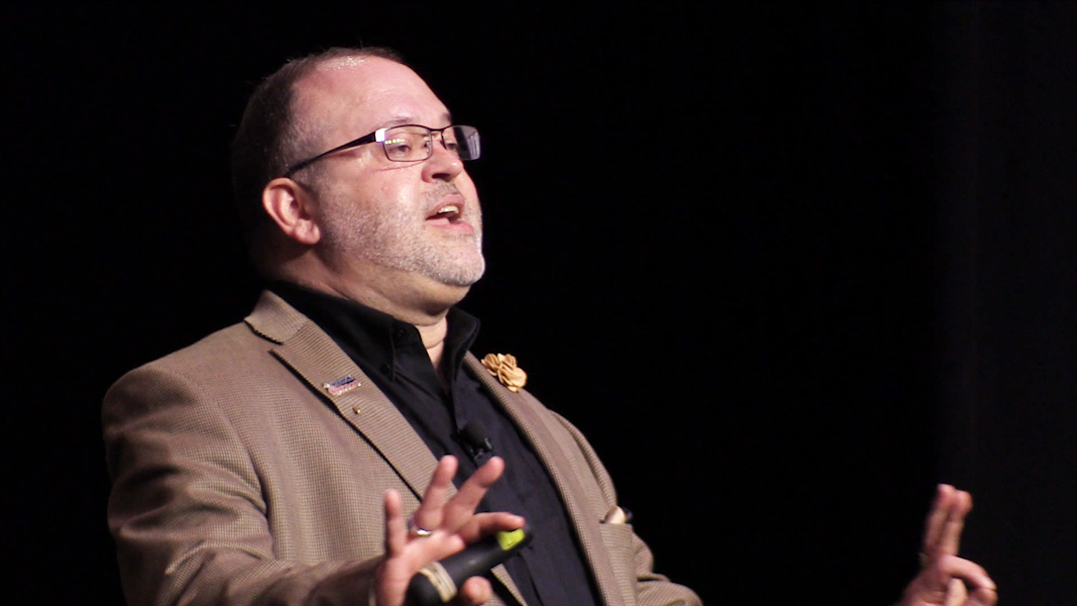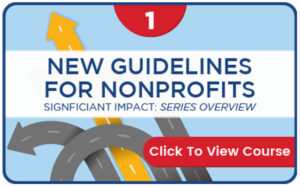
Meet Jimmy LaRose NANOE Co-Founder and Champion
January 31, 2020Balancing Your Network: Quantity vs. Quality
February 3, 2020New Guidelines for Nonprofits Confronts Charity’s Establishment
New Guidelines for Nonprofits Training Course by Dr. Kathleen Robinson has been designed for professionals who want to grow in their nonprofit career. New Guidelines for Nonprofits (NGN) is an 1,100 page desk reference that makes six major recommendations that ensures you become an expert who takes charity to scale.
PRESS HERE OR THE ICON BELOW TO SEE NEW GUIDELINES ONLINE TRAINING PLATFORM:
NGN is based on the work of high performing executives and and array of nonprofit experts who have achieved significant impact across our sector. It’s been divided into six sections:
Guideline #1 – Network & Engage – Harness The Power of Differentiated Relationships
Guideline #2 – Strong CEOs – Character, Competence, Courage, Vision, Actions & Achievements
Guideline #3 – Build Capacity – Secure Technology, Equipment, Legacy, Facilities and Working Capital
Guideline #4 – Boost Capacity – Secure Opportunity, Risk and Change Capital for Significant Impact
Guideline #5 – Evaluate Impact – Before, During and After Strategic Growth Actions
Guideline #6 – System Shock – Leadership Structures and Governance Cultures that Soar
VISIT HERE TO JOIN NANOE TODAY
Here’s what Kathy has to say about New Guidelines for Nonprofits Training Course: In this article, I summarize the six guidelines for Nonprofit Growth and Impact, which is a series produced by the National Association of Nonprofit Organizations & Executives. NGN is for those leaders who increase their impact. Most of us want to achieve impact. But more and more of contributors, funders and donors expect that the impacts we make be of greater size have greater depth in terms of the change it produces in current thinking and is more pervasive in reaching a larger number of people. Most of us also want to grow and feel a great deal of unease that our visions always are inhibited by lack of the funds. How you handle the unease is at stake. I recently saw a mug that says, “Instead of cleaning house, I just turn off the lights.” Well, unfortunately, the unease your feel regarding your own effectiveness and resource levels won’t go away unless you intentionally build capacity.
These six guidelines are meant to help you build capacity that makes a difference and fosters growth and impact. You’ll find all Six Guidelines, Videos and Exams at NANOE Central. New Guidelines for Nonprofits Training Course is free for NANOE Members. Read the summary of all the key practices. Each key practice is outlined and described and ends with “decision time” where you’re asked to reflect on your personal values, beliefs and behaviors regarding the concepts discussed in the key practice. At the end of each booklet is a glossary of terms so that you can make sure that you’re defining things in the same way that the author defines them.
New Guidelines for Nonprofits IS ABOUT YOU!
We ask you to emulate high performing leaders character, competence, courage, vision, action and achievements. Are you a Strong CEO? New Guidelines covers leadership behaviors and the actions of all leaders within your organization. If you want to grow and develop and reach greater impact, it starts with you and your leadership. It’s about the choices you make as leaders and the actions you take within your organization. We challenge you to take an in-depth look at your inner person. What is your world view? How do your behaviors and actions affect personal outcomes? What you believe about leadership? Are you helping people engage in a concerted direction to accomplish your mission. It’s about your moral compass. What will you do and not do to and with others? What lines will you not cross? NGN is also about core virtues. Virtues are key habits of leadership that are seen in daily practice. We look at humility, courage and care for others as the basis for a high performing nonprofit leader who achieves impact.
VISIT HERE TO JOIN NANOE TODAY
Simply put, New Guidelines for Nonprofits will transform you both personally and professionally. Thank you for taking a few moments to learn more about our movement. I look forward to meeting you personally.
Sincerely Yours,
Kathleen Robinson, Ph.D., CNE, CDE, CNC
NANOE Co-Founder
The post New Guidelines for Nonprofits Confronts The Norms appeared first on NANOE | Charity’s Official Website.

